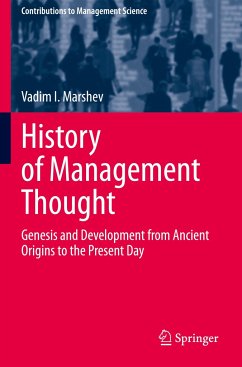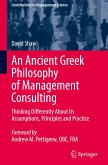This book describes the millennia-long process of the genesis, formation, struggle, and change of views on the management of social organizations in various countries around the world; in other words, it characterizes the worldwide evolution of the History of Management Thought (HMT) - ideas, concepts, theories, paradigms, and scientific schools - from Antiquity to the present.
The book is the outcome of extensive research, based on the analysis, generalization, and systematization of foreign and domestic published literature, as well as on the gathering and analysis of unique archival materials. For the first time in the historical and managerial literature, the book puts forward original definitions of three historical and managerial sciences - the History of Management, the History of Management Thought, and the Historiography of Historical and Managerial Research. It addresses the main challenges in pursuing Historical and Scientific Research (HSR), the main"subject" levels of HSR and specific methodological problems concerning HMT, as well as epistemological methods for identifying key factors in and causes of the advent and evolution of HMT.
This book presents both the origins of management thought dating back to the 5th millennium BC and the latest management concepts of the early 21st century. In particular, it traces the origins and sources of management thought, reflected in the works of thinkers and statesmen of the Ancient World (Egypt, Western Asia, China, India, Greece, and Rome), the era of feudalism, and the Middle Ages (Byzantium, Western Europe, and England), the era of inception capitalism (Western Europe and the USA), as well as the new and recent history of management thought of the 20th and 21st centuries. In addition, for the first time in History of Management literature, it presents the history of Russian management thought from the 9th century to modern concepts and scientific schools.
The book is the outcome of extensive research, based on the analysis, generalization, and systematization of foreign and domestic published literature, as well as on the gathering and analysis of unique archival materials. For the first time in the historical and managerial literature, the book puts forward original definitions of three historical and managerial sciences - the History of Management, the History of Management Thought, and the Historiography of Historical and Managerial Research. It addresses the main challenges in pursuing Historical and Scientific Research (HSR), the main"subject" levels of HSR and specific methodological problems concerning HMT, as well as epistemological methods for identifying key factors in and causes of the advent and evolution of HMT.
This book presents both the origins of management thought dating back to the 5th millennium BC and the latest management concepts of the early 21st century. In particular, it traces the origins and sources of management thought, reflected in the works of thinkers and statesmen of the Ancient World (Egypt, Western Asia, China, India, Greece, and Rome), the era of feudalism, and the Middle Ages (Byzantium, Western Europe, and England), the era of inception capitalism (Western Europe and the USA), as well as the new and recent history of management thought of the 20th and 21st centuries. In addition, for the first time in History of Management literature, it presents the history of Russian management thought from the 9th century to modern concepts and scientific schools.








